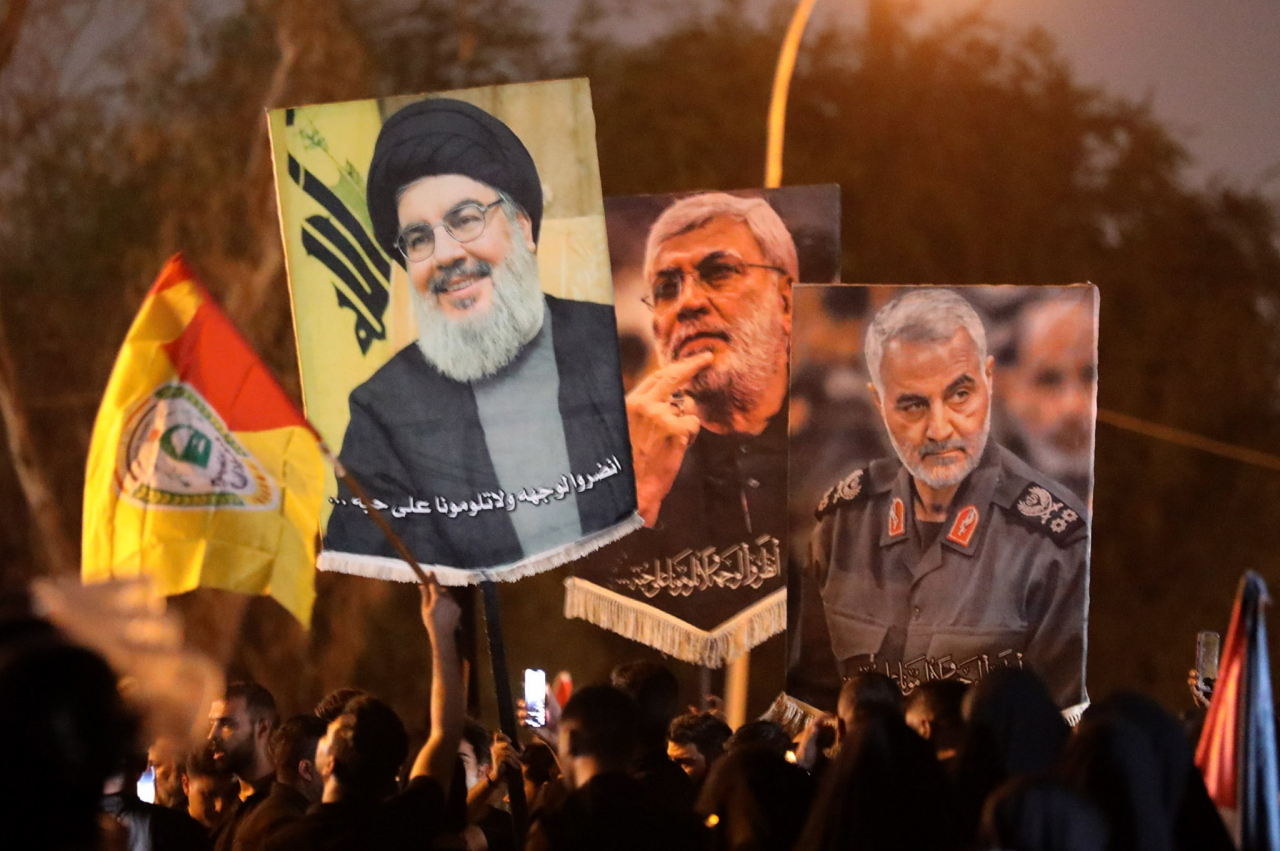 |
Supporters of the Hezbollah Brigades, an Iraq-based Shiite militia group ideologically aligned with Lebanon's Hezbollah, carry pictures of late Hezbollah leader Hassan Nasrallah, late deputy of Iraq's Popular Mobilization Forces Abu Mahdi al-Muhandis and late top Iranian commander Qasem Soleimani, during a protest against the killing of Nasrallah, near the entrance to the Green Zone in central Baghdad, Iraq, Saturday. (EPA-Yonhap) |
In the wake of Sayyed Hassan Nasrallah's killing, Hezbollah faces the enormous challenge of plugging the infiltration in its ranks that allowed its arch enemy Israel to destroy weapons sites, booby-trap its communications and assassinate the veteran leader, whose whereabouts had been a closely guarded secret for years.
Nasrallah's killing on Friday came barely a week after Israel's deadly detonation of hundreds of booby-trapped pagers and radios. It was the culmination of a rapid succession of strikes that have eliminated half of Hezbollah's leadership council and decimated its top military command.
In the days before and hours after Nasrallah's killing, Reuters spoke to more than a dozen sources in Lebanon, Israel, Iran and Syria who provided details of the damage Israel has wrought on the powerful Shi'ite paramilitary group, including to its supply lines and command structure. All asked for anonymity to speak about sensitive matters.
One source familiar with Israeli thinking told Reuters, less than 24 hours before the strike, that Israel has spent 20 years focusing intelligence efforts on Hezbollah and could hit Nasrallah when it wanted, including in the headquarters.
The person called the intelligence "brilliant," without providing details.
Israeli Prime Minister Benjamin Netanyahu and his close circle of ministers authorized the attack on Wednesday, two Israeli officials told Reuters. The attack took place while Netanyahu was in New York to speak at the UN General Assembly.
Nasrallah had avoided public appearances since a previous 2006 war. He had long been vigilant, his movements were restricted and the circle of people he saw was very small, according to a source familiar with Nasrallah's security arrangements. The assassination suggested his group had been infiltrated by informants for Israel, the source said.
The Hezbollah leader had been even more cautious than usual since the Sept. 17 pager blasts, out of concern Israel would try to kill him, a security source familiar with the group's thinking told Reuters a week ago, citing his absence from a commanders' funeral and his pre-recording of a speech broadcast a few days before.
Hezbollah's media office did not respond to a request for comment for this story. US President Joe Biden on Saturday called Nasrallah's killing "a measure of justice" for his many victims, and said the United States fully supported Israel's right to defend itself against Iranian-backed groups.
Israel says it carried out the hit on Nasrallah by dropping bombs on the underground headquarters below a residential building in southern Beirut.
"This is a massive blow and intelligence failure for Hezbollah," Magnus Ranstorp, a veteran Hezbollah expert at the Swedish Defense University. "They knew that he was meeting. He was meeting with other commanders. And they just went for him."
Including Nasrallah, Israel's military says it has killed eight of Hezbollah's nine most senior military commanders this year, mostly in the past week. These commanders led units ranging from the rocket division to the elite Radwan force.
Around 1,500 Hezbollah fighters were maimed by the exploding pagers and walkie talkies on Sept. 17 and Sept. 18.
On Saturday, Israel's military spokesperson Lt. Col. Nadav Shoshani told reporters in a briefing that the military had "real-time" knowledge that Nasrallah and other leaders were gathering. Shoshani did not say how they knew, but said the leaders were meeting to plan attacks on Israel.
Brig. Gen. Amichai Levin, commander of Israel's Hatzerim Airbase, told reporters that dozens of munitions hit the target within seconds.
"The operation was complex and was planned for a long time," according to Levin.
Hezbollah has shown the ability to replace commanders quickly, and Nasrallah's cousin Hashem Safieddine, also a cleric who wears the black turban denoting descent from Islam's Prophet Mohammed, has long been tipped as his successor.
"You kill one, they get a new one," said a European diplomat of the group's approach.
The group, whose name means Party of God, will fight on: by US and Israeli estimates it had some 40,000 fighters ahead of the current escalation, along with large weapons stockpiles and an extensive tunnel network near Israel's border.
Founded in Tehran in 1982, the Shi'ite paramilitary outfit is the most formidable member of Iran's so-called Axis of Resistance of anti-Israel allied irregular forces, and a significant regional player in its own right.
But it has been materially and psychologically weakened over the past 10 days.
Thanks to decades of backing from Iran, prior to the current conflict Hezbollah was among the world's most well-armed non-conventional armies, with an arsenal of 150,000 rockets, missiles and drones, according to US estimates.
That is ten times the size of the armory the group had in 2006, during its last war with Israel, according to Israeli estimates. (Reuters)







![[Herald Interview] How Gopizza got big in India](http://res.heraldm.com/phpwas/restmb_idxmake.php?idx=644&simg=/content/image/2024/11/20/20241120050057_0.jpg)